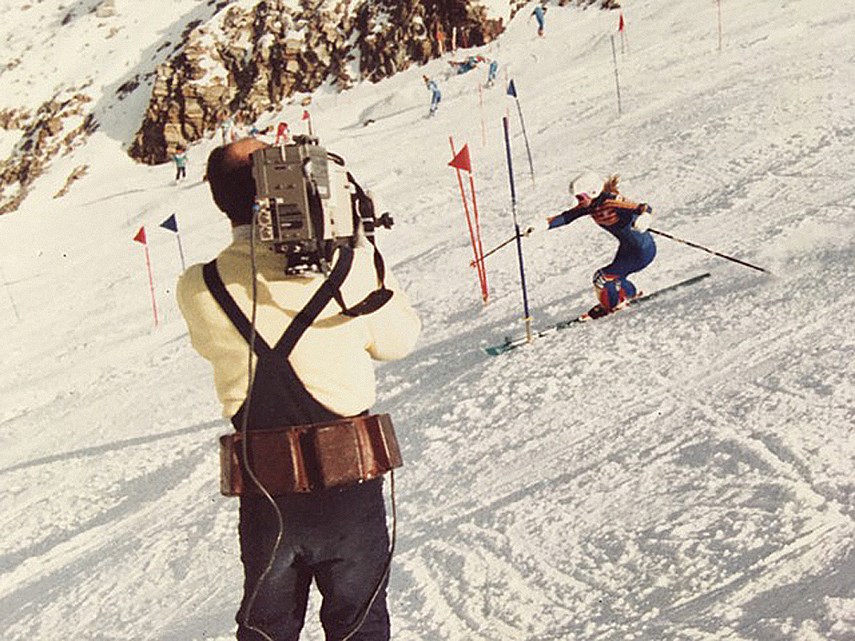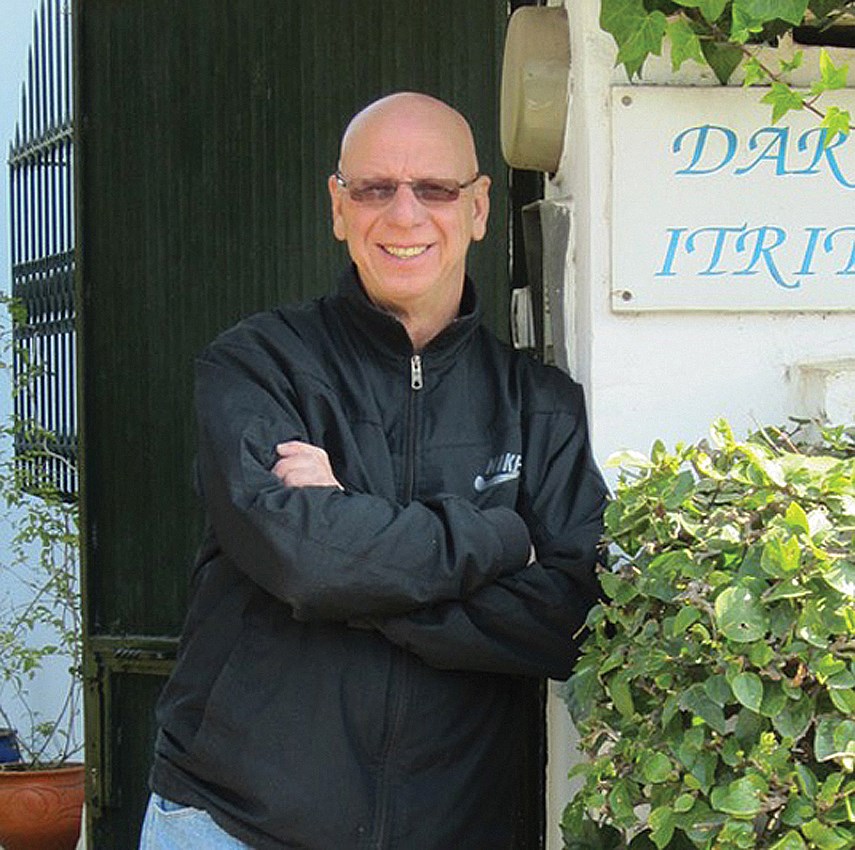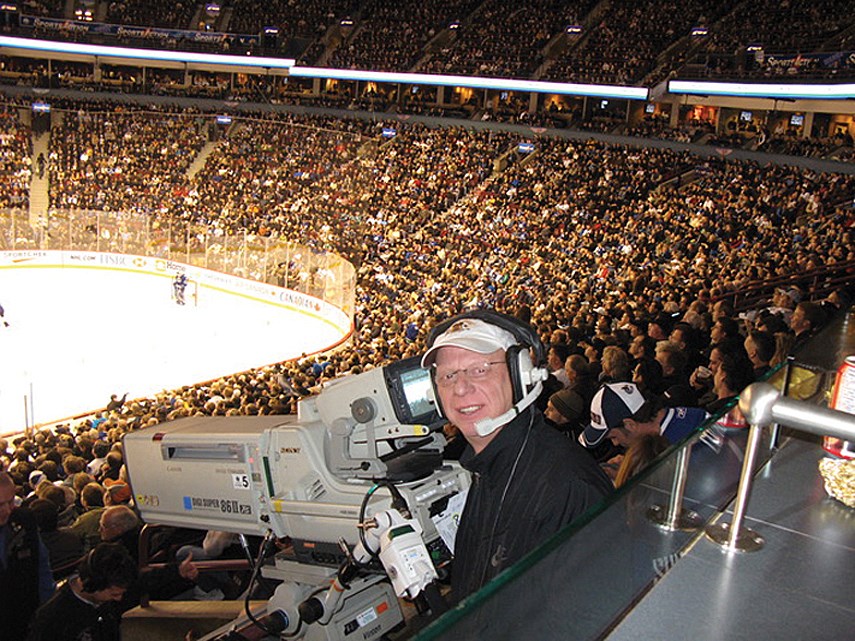He was most of the way up a mountain tied to a tree with 60 pounds of camera, batteries and film on his back.
Camera operator Michael Varga trained his lens on an empty expanse of sky and snow.
In five minutes or two seconds he’d hear his cue and – Shoosh! – a skier would swoop over the horizon like a hawk with a hunger pang.
“And if you blink, he’s gone,” Varga says. And then you get screamed at by CBC producers, he adds with a chuckle.
For more than 40 years Varga has been behind the lens at World Cups, Stanley Cups, Grey Cups, Olympics, and curling. He’s trained his camera on Bill Gates, shared candy with the Dalai Lama and ordered a hamburger for O.J. Simpson.
His recollections, opinions, and ramblings are collected in Inside View: The Eye Behind the Lens, written by Varga and Roxanne Davies.
While the action of the book takes place across the world, the book itself was born in Lynn Valley.
As a semi-retired reporter, Davies says she has, “this ability to sit and listen for hours to people’s stories.”
Recently, she’d been helping a friend in Cloverdale write a book. The book was fine. The commute was awful.
“Driving on Mondays behind those tractor trailers in the rain, in the snow, for two years,” Davies recalls.
After deciding she would never do another book in Cloverdale, she found herself chatting with Varga during a Friday night concert in Lynn Valley.
“He starts telling me all these stories and I go, ‘Ding, ding, ding! Here’s my next project,’” she laughs.
For his part, Varga seemed nonplussed by the idea.
He couldn’t spell and wouldn’t know where to start, he told her.
But Davies, Vargas says, was unswayed by his protests.
“She just said, ‘Look, I’m going to do a book on you whether you like it or not,’”
he recalls.
Davies wanted to write about the efforts we enjoy but never see.
“There’s so much we take for granted,” Davies says, explaining she’ll never watch alpine skiing again without sparing a thought for the “poor schmuck out there who’s freezing” with a camera.

The book is written in flashes and bursts and peppered with exclamation points, as though Varga is sitting across the table, trying to get in one more story before the bar closes.
In the space of one page, the narrative jumps from a mournful 1977 lunch with legendary DJ Wolfman Jack to chatting with songstress Celine Dion at the 1991 Juno Awards.
Varga’s career began in the early 1970s when he was hoping to parlay a summer job in CBC’s mailroom into a career as a camera operator. It was an ambition he’d nursed since he’d been a nine year old staring into a 21-inch black and white RCA Victor television.
The plan, however, was dashed in the time it takes a paper airplane to land.
Varga was waiting for his job interview at CBC Vancouver when he saw a friendly face. His buddy, Mark Forrester, was folding envelopes into airplanes and firing them into mail slots.
“Here, you want to try?” he offered.
Varga’s plane had just taken wing when the personnel manager walked in.
The ensuing interview was short but painful.
But while he didn’t get the mailroom job, his job application floated to the desk of a technical manager in need of a camera operator.
“If I hadn’t folded those paper airplanes, I’d still be working in the mailroom!” Varga writes. “It was fate and a little bit of luck.”
He estimates he was sometimes working 100 hours a week, but he loved his job and the perspective it offered.
Early in his career Varga was shooting Quebec pop sensation René Simard.
Simard was known for whipping fans into a frenzy, but the producers of the show assisted any way they could.
“Awful as it seems by today’s standards, occasionally we would feed a live audience of kids chocolate and soda pop to help energize them,” he writes.
But what he really loved to do was shoot sports.

Varga seemed most at home shooting hockey games in the unprotected space between the team benches. The spot was known as the suicide box, and for good reason.
Tiger Williams used to aim slapshots at him, Davies says.
“In those days there were characters,” Varga smiles.
The mention of Tiger Williams stirs good memories for Varga.
He remembers Willliams skating over to him and talking about opposing player Lanny McDonald.
“I got the VCR going; second period, about the five-minute mark, I’m going to punch him,” Williams told him. “Make sure you’re on me.”
In the interest of a fair fight, Varga got McDonald’s attention.
“Lanny, you know Tiger’s going after you?” he asked.
“He said, ‘Yeah, it’s the second period at the five-minute mark.’”
There was another time when Williams went into the boards and his stick popped up and slapped opposing coach Scotty Bowman in the head.
Later, the referee asked for Varga’s opinion on the hit.
Did Williams do that on purpose?
No, Varga told the ref, it was just one of those weird accidents.
Shortly afterward, he told a disbelieving Williams about the conversation.
“I told him I didn’t think you did it on purpose.”
“Of course it was on purpose!” Williams yelled.
The schedule could be gruelling. After one of those multiple overtime “for-goodness-sake-just-put-one-in-the-net-so-we-can-go-home” games, Varga drove into a police roadblock by the Lions Gate Bridge.
He hadn’t been drinking, he told the officer. He’d been at the hockey game.
“What was the score?” the cop asked him.
Varga didn’t have a clue.
Sitting across from each other at a Marine Drive coffee shop, Davies asks Varga when he was the happiest in his career.
“The happiest time?” Varga reflects.
There was a time he won an Emmy, but that wasn’t necessarily the happiest.
“I got it for doing nothing,” he says.
He accepted it as a lifetime achievement award/doorstop, he says.
“It’s $450 US. You don’t get it for free.”
Picking up the book and leafing through it, Varga drifts from one memory to another. There were moments when he hated the job, he says. There was backstabbing and incompetent producers, but ultimately, it was a comfortable place to be.
He’d wanted to call the book Privileged View, he says, noting he was privileged to be where he was.
Looking at the book, Varga stops at a picture of Princess Diana. It might have been the Santa Claus parade or the Calgary Stampede. But it doesn’t really matter which.
“That picture tells it all. That’s how I felt every day. Happy.”



